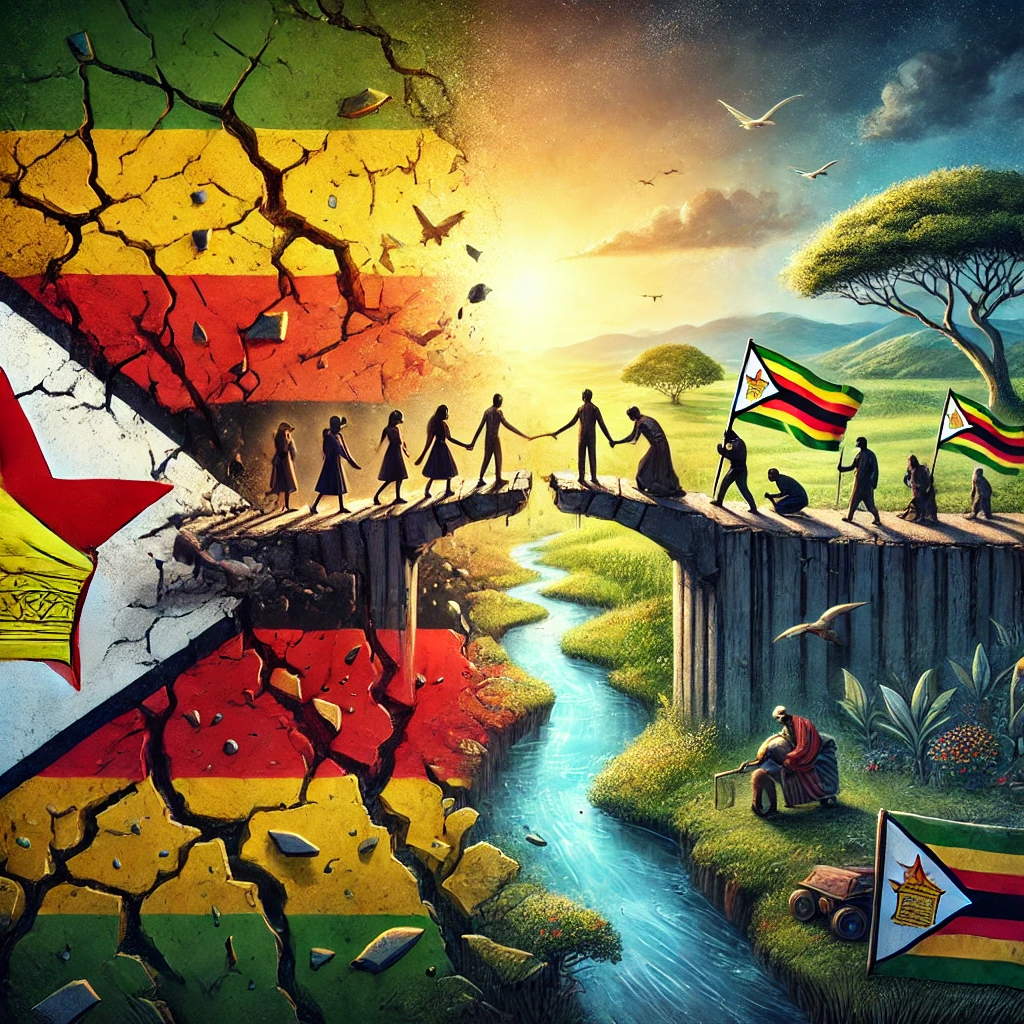
National Reconciliation – The Crossing Bridge to National Renewal
At Independence in 1980, we inherited a nation Julius Nyerere described as a jewel of Africa. We had a robust Industrial economy with a stable local currency which was competitive with the major currencies of the developed nations. Our Agricultural produce was abundant and the best in the region and this effectively gave Zimbabwe the status and recognition as the bread basket of Africa.

‘Independence’ came with many promises for better livelihoods and shared prosperity. Sadly this never materialized on the whole and the opposite happened. The nation took the opposite turn from the onset. Unlike South Africa, which turned towards democracy, inclusivity, and the rainbow nation; we took a turn toward tyranny, One-party state, state capture, maladministration, impunity, and plunder of public resources through political violence. This has resulted in perpetual retrogression and the prevailing catastrophic brokenness.
Democracy was never introduced in Zimbabwe and does not exist. Our inherited public institutions are now broken and have become ruins and desolations. Society is very fragmented, individualistic, and plagued with deception and corruption. We must acknowledge that the system is broken and proceed to converge and figure out a way out of this brokenness toward national renewal through inclusive dialogue and a negotiated settlement.
Getting the people to acknowledge that the system is broken and that we bear collective responsibility is part of the process of National Reconciliation. Coming together (national convergence) and figuring out, reviewing, analyzing, and evaluating our cultural identity of fragmentation and corruption toward the cultural clarity of humanity, dignity, and integrity (hunhu -Ubuntu), oneness, meritocracy, and nationhood is part of national reconciliation. Reviewing and underwriting a new social contract, shared vision, and foundational pillars for our new republic is also part of national reconciliation.
Given the reality of the prevailing culture of fragmentation, and broken public institutions, the only pragmatic way toward national renewal is through inclusive dialogue and a negotiated settlement, and this is the time and season for this campaign.
Understanding Colonialism and the Independence Transition
The British settlers came in 1890 and began to build a modern civilization that mirrored the culture of their home country – Great Britain. They used political violence to conquer, subjugate, and displace the natives as they pleased. They went on to strip away the dignity and cultural identity of the natives and treated them as slaves.
This racial segregation, subjugation, and oppression of the natives fueled the Chimurenga/ armed struggle civil war by the Black Rhodesians against the White Rhodesians which culminated in the Lancaster House negotiations of 1979 and the political settlement / Independence of 1980.
The Key objective of the liberation/ civil war was inclusivity and shared prosperity as clearly articulated by Josiah Tongogara the ZANLA Commander. In other words, the country was supposed to transition from a minority government or exclusive white rule to democratic rule and a majority government.
With the benefit of hindsight, it has become common knowledge that liberation, majority rule, or political Independence did NOT happen and remains elusive. The Liberation agenda was hijacked into a power grab or regime change agenda and those who disagreed and stood in the way of this Agenda were either incarcerated or eliminated. Zimbabwe transitioned from a minority government and became a defacto one-man rule dictatorship and political violence has repeatedly been used to enforce oppression and subjugation
The outcome of this protracted oppressive rule has been perpetual retrogression and catastrophic corruption and brokenness which has since cascaded across all spheres of society. Our real challenge from now on is how to redeem the nation from this plague of corruption and brokenness in society and steer the Ship of State into a new trajectory of justice, civilization, and sustainable development.
The Road to and Campaign for National Renewal
If we the people have any desire for progress and renewal, and I believe we do, then we must first understand the true nature of our present cultural reality;
We must reflect on these points and obtain clarity on the true character and nature of our brokenness, then together proceed to develop a substantive Shared vision, blueprint, and effective strategy toward national renewal and shared prosperity
So where are the citizens? where are the sons and daughters of the soil? Where are the statesmen and those patriotic to Zimbabwe and the common good? We must now converge and work together to unify and organize the people and steer the nation in the right direction and trajectory of growth and development.
Progress requires that our best people must be making the critical decisions. Progress requires us the people to be very organized and or structured. It demands justice and righteousness. Progress requires inclusivity and collaboration, and progress requires us to be strategic, prioritize, and do first things first.
This national reconciliation campaign is the process of our recalibration, reconfiguration, renewal, or reorganization so that we can be delivered from all manner of brokenness and receive the necessary radical cultural transformation required for civilization and meaningful progress
The Journey and campaign begin now. It starts with the citizens taking a position for national reconciliation and working together to renew Zimbabwe.
Iwe neni Tinebasa
Sisonke
Siyabonga , Thank you, Ndatenda
Respectively submitted by William Chimbetete – Campaign Director